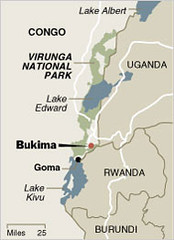
Map of the eastern region of the Democratic Republic of Congo.
Originally uploaded by Pan-African News Wire File Photos
Fri Jun 19, 2009 12:41pm GMT
* Government, donors failing in army reforms
* Chaotic units threaten fragile peace deals
* Situation risks undermining Kabila's future
By Joe Bavier
HOMBO, Congo, June 19 (Reuters) - The failure of efforts by Congo and its foreign backers to forge an army from former belligerents is straining the latest peace deal near to breaking point and threatens to undermine the government's authority.
Donor nations and the largest ever U.N. peacekeeping force helped organise 2006 elections meant to usher in a new era of peace and investment in the nation that has vast mineral resources but has been plagued by years of conflict.
But Congo's army remains in tatters, with foreign security sector reform plans still unimplemented and army units, cobbled together from various pro- and anti-government factions, often accused of war crimes and worsening the humanitarian crisis.
Operations begun under a deal with former foe Rwanda aimed at ending a rebellion by Congolese Tutsi CNDP rebels and rooting out Rwandan Hutu FDLR rebels have stalled. Some unpaid soldiers have mutinied, others have turned their guns on the U.N. force.
"The main short-term risk is that the fragile integration of the CNDP could be threatened by the lack of payments and infighting in the army and put in danger the peace process," said Jason Stearns, a Congo analyst.
"It's also exacerbating the humanitarian crisis and undermining the operations against the FDLR."
Despite the end of the Tutsi rebellion led by dissident General Laurent Nkunda until his arrest in January, the United Nations says a further 800,000 civilians have been forced from their homes this year.
A return to conflict could also undermine the improving relations with Rwanda and further set back chances of bringing formal investment to develop mineral resources plundered during wars that left an estimated 5.4 million dead since 1988.
The latest attempt to integrate rebels into the army is far from being the first to founder.
A plan to create a united army of 36,000 soldiers before the 2006 election came to little despite help from the United States, former colonial ruler Belgium, South Africa and Angola.
Another plan to create 12 rapid reaction battalions last year never got off the ground. Attempts to rid the army of crippling mismanagement and corruption have also failed, leaving troops ill-equipped and salaries unpaid.
PLUNDER
"It's endemic. The commanders get the money and don't give it to their soldiers," said Lieutenant-Colonel Jean-Paul Dietrich, military spokesman the U.N. mission in Congo.
Unpaid soldiers are forced to live off the populations they are meant to be protecting. In frustration at their poor conditions, some soldiers had even opened fire on U.N. peacekeepers who are supposed to be assisting them, he said.
Military analysts say the January peace deal that integrated thousands of Tutsi rebels and militia members into the army to fight the Hutu rebels had made matters worse, as units are now composed along ethnic lines, blocking reform attempts.
As a result, many local communities are seeking protection from traditional militia, such as the Mai Mai, which have long fought to defend local communities from other armed groups.
"It's better to stay with the Mai Mai than to be with the Congolese army. If the Mai Mai are here, at least we are protected," said Dynamic Kanguaka, a village chief near Hombo, as local gunmen readying for a patrol gathered to be sprinkled with water, Mai Mai protection from the enemy's bullets.
In the face of the criticism over the behaviour of the armed forces, Congo's government puts the blame elsewhere.
"The support we are receiving is not enough. The international community must help us 100 percent," Information Minister Lambert Mende told Reuters.
But the failure to bring peace to the east and to keep the army under control is undermining Kabila in a stronghold that was key to his victory in the 2006 election despite opposition in the capital Kinshasa and much of western Congo.
Already struggling to shore up a mining-dependent economy that has taken a battering from the global economic crisis, political analysts believe Kabila's own future could be in doubt unless he is able to take control of the security situation.
"Kabila has been caught up in an endless cycle of negotiations with armed groups in the east. The only arrow in his quiver is to co-opt these groups into the army," Stearns said.
"In the long-term, it's going to threaten his legitimacy and prolong the conflict in eastern Congo," he added.
(Editing by David Lewis)
No comments:
Post a Comment